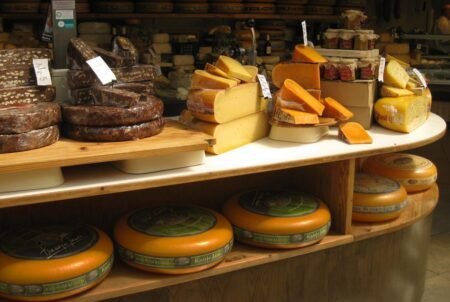New EU food labelling rules come into force on 13 December to ensure that consumers receive clearer, more comprehensive and accurate information on food content, and help them make informed choices about what they eat.
Advertisement
Key changes
Some of the key changes to the labelling rules are outlined below:
- Improved legibility of information (minimum font size for mandatory information);
- Clearer and harmonised presentation of allergens (e.g. soy, nuts, gluten, lactose) for prepacked foods (emphasis by font, style or background colour) in the list of ingredients;
- Mandatory allergen information for non-prepacked food, including in restaurants and cafes;
- Requirement of certain nutrition information for majority of prepacked processed foods;
- Mandatory origin information for fresh meat from pigs, sheep, goats and poultry;
- Same labelling requirements for online, distance-selling or buying in a shop;
- List of engineered nanomaterials in the ingredients.
- Specific information on the vegetable origin of refined oils and fats;
- Strengthened rules to prevent misleading practices;
- Indication of substitute ingredient for ‘Imitation’ foods;
- Clear indication of “formed meat” or “formed fish”; and
- Clear indication of defrosted products.
However, rules relating to mandatory nutritional labelling for processed food will only apply from 13 December 2016.
Food business operators have been given three years to ensure a smooth transition towards the new labelling regime for prepacked and non-prepacked foods. In addition, the Regulation provides for exhaustion of stocks for foods placed on the market or labelled before 13 December 2014 (N.B. this does not include exhaustion of stocks of labels).
The Commission has been working together with businesses to ensure that the new rules will be properly implemented. Work is also under way on developing an EU database to facilitate the identification of all EU and national mandatory labelling rules in a simple way. This will offer a user-friendly tool for all food business operators and for SME’s to consult. The work for the creation of the database should be carried out during 2015.
Background
Regulation (EU) No 1169/2011 on the provision of information to consumers replaces and combines into one piece of legislation previous labelling rules deriving from Directive 2000/13/EC regarding labelling, presentation and advertising of foodstuffs and Directive 90/496/EEC on nutrition labelling of foodstuffs and other legislative acts for specific categories of foods.
ANNEX
Main innovations introduced by Regulation (EU) No 1169/2011* on the provision of food information to consumers *All innovations will start to apply from 13 December 2014 with the exception of mandatory nutrition labelling which will be applicable from 13 December 2016. | |
Food concerned | Innovation |
All foods Nutrition declaration | Mandatory nutrition declaration from 13 December 2016* When the nutrition declaration is provided after 13/12/2014 it should comply with the new rules. *Some foods are exempted |
“Allergens” -Prepacked food | “Allergens” shall be indicated in the list of ingredients and shall be emphasised through a typeset that clearly distinguishes it from the rest of the list of ingredients, for example by means of the font, style or background colour. |
“Allergens” – Non-prepacked food | Mandatory allergen information. |
All food Legibility of labels | – Minimum font size – Voluntary information shall not be displayed to the detriment of space available for mandatory information. |
Foods sold through distance selling | Availability of all mandatory food information (except for date marking) before the purchase is concluded on the material supporting the distant selling (without supplementary costs for the consumer). All mandatory food information shall be available at the moment of delivery. |
Ingredients in form of engineered nanomaterials in food | All ingredients present in the form of engineered nanomaterials shall be clearly indicated in the list of ingredients. The names of such ingredients shall be followed by the word ‘nano’ in brackets. |
Refined oils and fats of vegetable origin | Indication and designation of ingredients: – Mandatory indication of the specific vegetable origin of oils / fats – The expression “fully hydrogenated” or “partly hydrogenated” must accompany the indication of a hydrogenated oil / fat |
Meat other than beef (swine, sheep, goat and poultry) | Mandatory origin labelling for meat of swine, sheep, goat and poultry The rules, with some exemptions, provide that the Member State or third country where the animal was reared and slaughtered will appear on the label. |
Frozen meat, frozen meat preparations and frozen unprocessed fishery products | Indication of date of freezing or the date of first freezing To be indicated as follows “frozen on day/month/year“ |
Defrosted foods: Foods that have been frozen before and which are sold defrosted
| The name of the food should be accompanied by the designation “defrosted”* *Some exemptions apply |
Meat products, meat preparations and fishery products containing added proteins as such, including hydrolysed proteins, of a different animal origin. | The name of the food shall bear an indication of the presence of those proteins and of their origin |
Meat products, meat preparations and fishery products which have the appearance of a cut / joint/ slice / fillet / carcase / portion of meat or fish | The name of the food shall include the indication of the presence of added water when this exceeds 5% of the weight of the finished product |
Meat products, meat preparations and fishery products which may give the impression that they are made of a whole piece of meat or fish, but actually consist of different pieces combined together by other ingredients, including food additives and food enzymes or by other means. | The name of the food shall be accompanied by the following indication “formed meat” or “formed fish”. |
“Imitation foods”: Foods in which consumers expect an ingredient or component to be normally used or naturally present but in reality is substituted with another. For example, fake cheese. | The name of the food of these foods shall be accompanied by a clear indication of the component or the ingredient that has been used for partial or whole substitution. |







